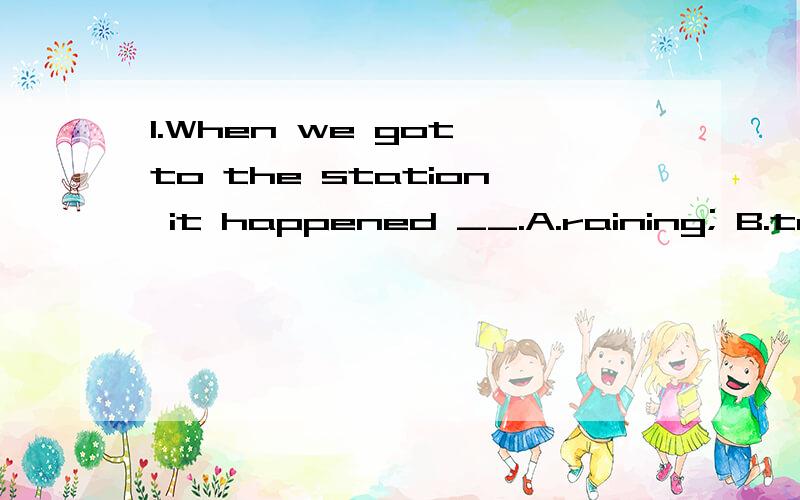1.When we got to the station it happened __.A.raining; B.to rain;C.to be raining; D.rained2.My father prefers __ football games while my mother enjoys __film.A.watching; seeing B.watching; seeC.to watch; seeing D.watch; see3.I have never seen the wor
来源:学生作业帮助网 编辑:作业帮 时间:2024/04/28 03:26:02

1.When we got to the station it happened __.A.raining; B.to rain;C.to be raining; D.rained2.My father prefers __ football games while my mother enjoys __film.A.watching; seeing B.watching; seeC.to watch; seeing D.watch; see3.I have never seen the wor
1.When we got to the station it happened __.
A.raining; B.to rain;
C.to be raining; D.rained
2.My father prefers __ football games while my mother enjoys __film.
A.watching; seeing B.watching; see
C.to watch; seeing D.watch; see
3.I have never seen the word __ that way before.
A.used B.using C.was used D.to used
说下理由,我选的是BAB 答案是CCA
1.When we got to the station it happened __.A.raining; B.to rain;C.to be raining; D.rained2.My father prefers __ football games while my mother enjoys __film.A.watching; seeing B.watching; seeC.to watch; seeing D.watch; see3.I have never seen the wor
1.C
happen为常用词语,指“一切客观事物或情况的偶然或未能预见地发生”,如:
The accident happened yesterday.
事故发生在昨天.
I happened to sit by her in the cinema.
在电影院我碰巧坐在她旁边.
碰巧下雨了,happen to rain,如果选择C,碰巧正在下雨,更准确一些吧.
2.C
prefer to do
容易混淆的就是这个prefer doing to doing
这个是“宁愿做...而不愿做...”
eg:,但是很题里只是比较喜欢做什么,用法就是prefer to do
enjoy doing
3.A
后置定语 被按照这样的方法试用 所以是used
using 表示不出被动的意思 单词是被用来的
was used 也可以用在从句里 但是要加which was used...
to used 介词多于 没有 see sth.to done 的举行 to 后面加动词原型或者动名词才对.
1.
不清楚!
2.C
因为prefer to do 和enjoy doing
3.A
因为这里其实省略了(what was) said
C
A
A
1.此题考查对语法点“过去进行时”的掌握程度。
when we got to the station,是一个时间点,强调一个时间点的动作,要用进行时。例如When the bell rang, I was watching TV. 要特别注意的是,考查时间状语when跟while时,出题者为了增加试题的难度,往往会考比较特别的语法点,例如此题的过去完成时,最常见的是考查虚拟语气。
...
全部展开
1.此题考查对语法点“过去进行时”的掌握程度。
when we got to the station,是一个时间点,强调一个时间点的动作,要用进行时。例如When the bell rang, I was watching TV. 要特别注意的是,考查时间状语when跟while时,出题者为了增加试题的难度,往往会考比较特别的语法点,例如此题的过去完成时,最常见的是考查虚拟语气。
2.此题考查“固定搭配”。
固定搭配没办法,只能死记硬背。prefer to do, enjoy doing sth.
其实,这里的prefer是截取了另外一个固定搭配prefer to do rather than do sth.所以,虽然有prefer doing的搭配,在这里为了对比喜欢的差异,要用prefer to do sth的结构。
3.此题考查“分词做定语”的语法点。
题目可以还原成I have never seen the word 【which was】 used that way before.
去掉which was就是题目原来的句子了。做这种题目的时候,要分析word 与use之间的主动还是被动关系。以确定使用主动语态还是被动语态。
收起
C,C,A
1.过去进行时,happened to be doing
2.prefer to do sth
prefer doing to doing
enjoy doing 固定搭配
3.被动用法 ,词被用,动词的过去分词做形容词来用,修饰word.
1.考察情景和happen的用法
1)happen to 是固定搭配,所以肯定选择B或C
2)happen to do sth 主语一般是描述自己,如
I happened to meet him in the tea room.
happen to be doing主语通常为抽象的,尤指天气
(个人以为happen to本身就表...
全部展开
1.考察情景和happen的用法
1)happen to 是固定搭配,所以肯定选择B或C
2)happen to do sth 主语一般是描述自己,如
I happened to meet him in the tea room.
happen to be doing主语通常为抽象的,尤指天气
(个人以为happen to本身就表示一种忽如其来的事情或者出乎意料之外的事情."忽如其来"一般是天气之类的变化,因为琢磨不透.而"出乎意料之外"一般是出乎叙述人自己意料之外的,或者是作为第三人描述他人当时切身感受的时候(如小说).
所以结果是C了....
2.考察prefers和enjoys的区别
共同点:两者都能表示"喜欢做某事"
如果两者表示"喜欢某物"都可以直接跟名词.如
prefer sth/prefer A to B
enjoy sth
区别:1)prefer多接to,例如
prefer to do sth喜欢做某事
prefer to do A rather than do B宁愿做A而不是B
2)enjoy多接V-ing.
enjoy doing sth.
3.I have never seen the word __ that way before.
这个就好象前面的人说的,考察定语.
1)定语作为形容词性来修饰一个名词(中心词)
这个名词可以是可以是一个形容词,如beatiful girl
也可以是动词转换而来的,可以是V-ed,也可以是v-ing.一般来说,v-ed表达一种被动的意思,而v-ing表示一种主动的意味.如:boiled water,表达的是被煮熟的水,强调水是被人煮熟的,是被动的.但是boiling water表达的就是正在沸腾的水,这个时候就是主动的意思,水在外部热量的作用下自己沸腾了
那么题目中的问题就是word和use的关系是主动还是被动,很显然是人用词语,那么是词语被人使用,被动的关系,所以就选择A
至于为什么不是C,就是句子中没有严格意义的两个动词,出现就是错误.~~~
呵呵,希望对你有帮助,能耐心看完~~~~
收起